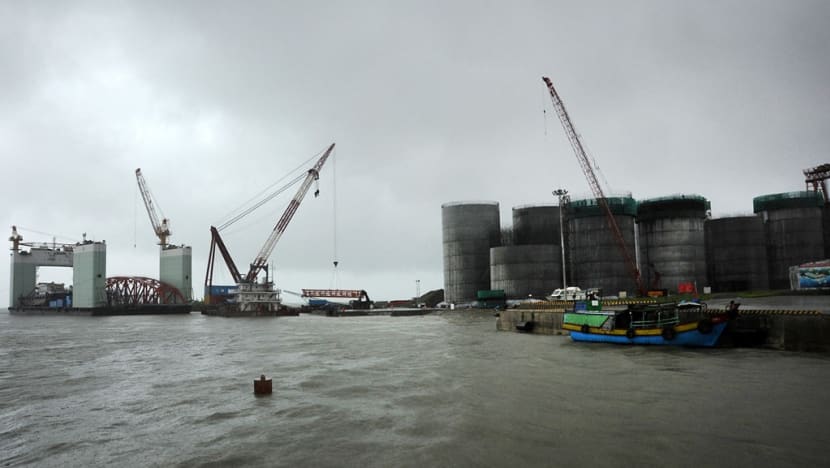Singapore firm rejects claims of 'favouring' Myanmar junta, says oil deal was signed before 2021 coup
Activist group Justice for Myanmar alleged in a recent report that Interra had "helped supply the junta" with over two million barrels of oil and "fuelled its ongoing war crimes".

Construction of oil tanks at an offshore block of Madae Island near the town of Kyauk Phyu in Rakhine State, western Myanmar. (Photo: AFP/ Lwin Ko Taik)

This audio is generated by an AI tool.
SINGAPORE: Mainboard-listed oil firm Interra Resources said on Thursday (Feb 6) that the extension of a production-sharing contract between its subsidiary and an entity controlled by Myanmar's government was done years before the current ruling military seized power in the country in 2021.
The statement, issued at night, came in response to queries by the Singapore Exchange (SGX) after activist group Justice for Myanmar alleged in a Jan 29 report that Interra had "helped supply the junta" with more than two million barrels of oil worth over US$150 million and "fuelled its ongoing war crimes".
"The current IPRCs (improved petroleum recovery contracts) were obtained and extended under the civilian government and prior to the military coup in 2021," Interra said.
Interra requested on Feb 6 that its shares be suspended from trading on SGX before the market opened on Thursday.
Shares of Interra last closed at S$0.036 (US$0.027) on Friday, Jan 31, before it imposed its own trading halt on Monday, Feb 3. Self-imposed pauses can last for up to three days, after which a formal request to SGX is required.
The Singapore petroleum explorer, which also has activities in Indonesia, said it is seeking legal advice about its compliance with foreign laws and will ask for the trading suspension to be lifted once it has clarity over the compliance issue.
Interra holds a participating interest of about 60 per cent in Goldpetrol Joint Operating Company (GJOC), according to its website.
GJOC operates two of the onshore producing oil fields in Chauk and Yenangyaung in central Myanmar.
GJOC secured the production-sharing contract for oil exploration and production with Myanmar Oil and Gas Enterprise (MOGE), Myanmar's state oil and gas enterprise, in 1996. The deal was then extended for 11 years in April 2017.
GJOC continues to operate in Myanmar under the terms of the improved petroleum recovery contracts, which have remained unchanged since 2021 coup, Interra said.
"The company has no control over or power to dictate how the MOGE distributes or uses the oil that is produced by GJOC," the company said, calling the activist group's claims "sensationalisation".
"The report therefore contains untrue allegations that GJOC is 'favouring the junta', 'has long enjoyed a close relationship with the Myanmar military' or that GJOC signed the contracts with the 'previous military junta'," it said.
MOGE was sanctioned by the United States and the European Union after the coup.
Interra also rejected allegations in the Justice for Myanmar report that GJOC had ramped up its output after the coup attempt.
Citing its annual report for the financial years ending between 2019 and 2023, it pointed out that GJOC’s gross oil production in Myanmar had remained "largely consistent" for those five years, with its peak output recorded in 2020, which was before the coup.
On allegations that the group's revenue comes from the provision of oil by GJOC, Interra said that it was "erroneous" to suggest that any such increase is linked to the junta's activities.
As a commodity business, revenue is exposed to fluctuations in prevailing crude oil and natural gas prices, it added.
The company said it will make further announcements when there are material developments.
STANCE ON MYANMAR
Myanmar has been in turmoil since early 2021 when its military overthrew the elected civilian government of Nobel laureate Aung San Suu Kyi, triggering pro-democracy protests that morphed into a widening armed rebellion that has taken over swathes of the country.
Since February 2021, the Monetary Authority of Singapore (MAS) has been engaging Singapore’s financial institutions on measures to guard against money laundering and terrorism financing risks emerging from the situation in Myanmar.
Methods such as the deployment of data analytics to better identify risks and apply appropriate risk mitigation measures, particularly around the detection of front and shell companies being used to potentially evade sanctions, have been successful among these institutions, said a spokesperson for Singapore's Ministry of Foreign Affairs (MFA) in June last year.
Apart from financial institutions, the government also conducts regular outreach to companies to ensure alignment with Singapore’s export control policy on Myanmar.
Inter-agency efforts are in place to ensure Singapore’s export control is not being undermined while ensuring that legitimate trade with Myanmar is not blocked, MFA said then.
“Legitimate trade and financial links between Singapore and Myanmar are necessary to support the livelihoods of the Myanmar people,” the ministry added.
Singapore has been “very careful to avoid inadvertently causing greater hardship” for Myanmar’s population, MFA said.














